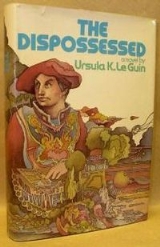
novel by Ursula K. Le Guin
, set in the same fictional universe
as that of The Left Hand of Darkness
(the Hainish Cycle). The book won the Nebula Award for Best Novel
in 1974, both the Hugo
and Locus
Awards in 1975, and received a nomination for the John W. Campbell
Memorial Award in 1975. It is also notable for achieving a degree of literary recognition unusual for science fiction works.
The story explores many ideas and themes, including anarchism and revolutionary societies, capitalism, individualism and collectivism, and the Sapir–Whorf hypothesis
.
It is also notable for its description of the invention of the new physics that is the basis for the fictional ansible
, an instantaneous communications device that plays a critical role in Le Guin's Hainish Cycle.
It is of the nature of idea to be communicated: written, spoken, done. The idea is like grass. It craves light, likes crowds, thrives on crossbreeding, grows better for being stepped on.![]()
He had assumed that if you removed a human being's natural incentive to work—his initiative, his spontaneous creative energy—and replaced it with external motivation and coercion, he would become a lazy and careless worker. [...] The lure and compulsion of profit was evidently a much more effective replacement of the natural initiative than he had been led to believe.![]()
No doors were locked, few shut. There were no disguises and no advertisements. It was all there, all the work, all the life of the city, open to the eye and to the hand.![]()
A child free from the guilt of ownership and the burden of economic competition will grow up with the will to do what needs doing and the capacity for joy in doing it. It is useless work that darkens the heart. The delight of the nursing mother, of the scholar, of the successful hunter, of the good cook, of the skilful maker, of anyone doing needed work and doing it well—this durable joy is perhaps the deepest source of human affection, and of sociality as a whole.![]()
There's a point, around age twenty, [...] when you have to choose whether to be like everybody else the rest of your life, or to make a virtue of your peculiarities.![]()
The individual cannot bargain with the State. The State recognizes no coinage but power: and it issues the coins itself.![]()
You cannot buy the Revolution. You cannot make the Revolution. You can only be the Revolution. It is in your spirit or, it is nowhere.![]()
With the myth of the State out of the way, the real mutuality and reciprocity of society and individual became clear. Sacrifice might be demanded of the individual, but never compromise: for though only the society could give security and stability, only the individual, the person, had the power of moral choice—the power of change, the essential function of life. The Odonian society was conceived as a permanent revolution, and revolution begins in the thinking mind. ![]()

